Note
What retelling makes you go like this

I haven’t read a lot of retellings (bc I’m picky as hell) but every time I hear a Medusa retelling make Perseus a shallow one dimensional villain I get so mad. Like I understand parodying the heroic characters as the “real villains” and making the monster the real hero (that’s literally the entirety of the Shrek franchise) but when so many retellings depict a teenager who is trying to protect his mother from a tyrant as a bad guy I can’t help but side eye.
Like if it was one or two retellings I wouldn’t care but this trend is so common that ppl genuinely believe he’s an evil monster and strip him of all the complexity and good qualities that I love about him in the first place.
So ig the most direct answer to your question is “Stone Blind” and “The Shadow of Perseus”.
#his age is never specified but it’s implied he went on his quest once he reached adulthood so around 18#which is considered a teen nowadays#it’s even funnier when these retellings keep Perseus a teenager but still antagonize him#gurl I am not beefing with a child just bc he’s annoying I have two younger brothers and my tolerance levels are off the charts#tho that’s specifically in Athens since other regions have different ages for adulthood#I’ve seen ppl throw a whole lot of numbers around saying that’s his age#which is a little annoying lol#greek mythology#ancient greek mythology#greek pantheon#Perseus#perseus and medusa#perseus and andromeda#greek goddess#Gorgon#Athena
2 notes
·
View notes
Text
Bruh imagine if ppl shipped Hera with Lamia like ppl do with Medusa and Athena? That’s a world I’m very happy I do not live in.
#no Patrick you can’t fix a shit relationship between two women by shipping them#greek mythology#ancient greek mythology#greek pantheon#greek goddess#hera#hera goddess#hera deity#hera greek mythology#Athena#athena greek mythology#athena goddess of wisdom#athena goddess#athena deity#Medusa#medusa retelling#gorgon#lamia
6 notes
·
View notes
Note
HELP

ITS ATHENA WHEN ZEUS SAID SHE HAD TO MARRY HEPHAESTUS
Lmaoooooo
Also Zeus:

#birds are so fucking funny man#greek mythology#ancient greek mythology#greek pantheon#greek goddess#Athena#athena greek mythology#athena goddess of wisdom#athena goddess#athena deity#hephaestus greek mythology#hephaestus god#hephaestus#hephaistos#Zeus#zeus greek mythology#zeus deity
17 notes
·
View notes
Note
Personally I think the marriage was bad for both of them. Hephaestus ended up in a marriage where he didn’t feel loved, was cheated on and ended up having a worse self-esteem/self-image. Aphrodite was forced to deny her very godly role of love and lust to be with some she did not have those feelings for. They both deserve to be with someone else (Aglaia and Ares, double A batteries to fix a love life).
I mostly agree, tho I don’t think Aphrodite necessarily didn’t have feelings for him, he makes cool stuff for her and her children and she shipped the Lemnian women with the Argonauts in order to repopulate Lemnos for him (tho the reason it was depopulated in the first place is bc of her tho ig she felt bad and wanted to reconcile).
There’s also the point that Hephaestus actually wanted to marry Athena (even tho she didn’t want him back) and if I remember correctly it’s only modern scholars theories that Hephaestus demanded Aphrodite’s hand in marriage in order to free Hera to explain why they are together, bc information about their marriage is so spotty (it’s so bad that ppl had to analyze pottery art to make sense of this marriage), my conspiracy theory is that Hephaestus might not have even wanted to marry Aphrodite in the first place and it was arranged marriage for him too, that when Athena refused to marry him Zeus offered him Aphrodite instead.
#but that’s just a theory#A GAME THEORY#greek mythology#ancient greek mythology#greek pantheon#greek goddess#hephaestus greek mythology#hephastios#hephaestus god#hephaestus#hephaistos#hephaestus x aphrodite#aphrodite x hephaestus#aglaia#aglaea#ares#ares greek mythology#ares greek god
11 notes
·
View notes
Text
We are seeing the Hades-ification of Ares in real time.
#like how ppl romanticized Hades in early tumblr#ppl are romanticizing Ares#and with how ppl demonize Demeter to make Hades look better#ppl demonize Hephaestus to make Ares look better#time is a flat circle#greek mythology#ancient greek mythology#greek pantheon#hades#ares#ares greek mythology#ares greek god#ares deity#ares god of war#hades greek mythology
57 notes
·
View notes
Note
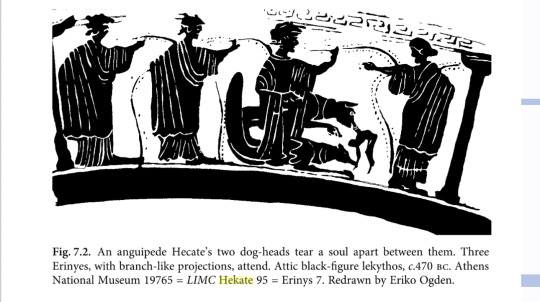
In Lucian's second-century AD Philopseudes we meet a Hecate of a form seemingly quite similar again to the lekythos image, for all its satirically exaggerated nature. Eucrates tells how he encountered Hecate one day in the woods: 'I saw a fearsome woman approaching me, almost half a stadium's length high. In her left hand she held a torch and in her right a sword twenty cubits long. Below the waist she had snake-foot; above it she resembled a Gorgon, so far as concerns the look in her eyes and her terrible appearance, I mean. Instead of hair, writhing snakes fell down in curls around her neck, and some of them coiled over her shoulders.' He goes on to explain that the goddess' dogs, by whose barking her arrival was anticipated, were 'taller than Indian elephants ... similarly black and shaggy, with dirty, matted hair'. Eucrates was able to avert the visitation with a magic ring. As he activated it, 'Hecate stamped on the ground with her snake-foot and created a huge chasm, as deep as Tartarus. Presently, she jumped into it and was gone.' Eucrates was then able to peer into the underworld before the chasm closed behind her. The detail of the single serpent-tail matches strikingly with the Hecate of the lekythos. The narrative leaves it unclear whether Hecate's dogs are attached to her, again as on the lekythos, from Daniel Ogden Drakon: Dragon Myth and Serpent Cult in the Greek and Roman Worlds
I just know so many ppl would still be like:

6 notes
·
View notes
Text
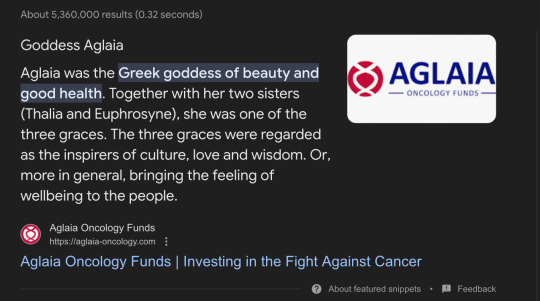
Y’all I was researching Aglaia and this was the first result lol
#greek mythology#ancient greek mythology#greek pantheon#greek goddess#aglaia#aglaea#charities#graces
5 notes
·
View notes
Note
in some Orphic myths Persephone was said to be with monstrous appearance that her mother abandoned her unfortunately the myth on how she got pregnant was horrific
Yeah I’ve heard about that, nasty af. Tho as a character designer I’m really interested in giving Persephone a more monstrous appearance, like she’s usually designed as a cutesy flower girl but monstrous Persephone has a lot of potential.
#it also makes Hades a monster fucker#like Poseidon lmao#greek mythology#ancient greek mythology#greek pantheon#greek goddess#persephone deity#persephone goddess#persephone hades#hades and persephone#persephone#orphic mythology
13 notes
·
View notes
Text
Honestly I really don’t get how it’s a well understood idea that Ares represented the brutality of war while Athena represented the more “civilized” aspect. But it doesn’t seem to click that the brutal side of war includes the murder and enslavement of innocent people.
Ares is not the protector of women in greek mythology.
He is never presented as such in any source, there is no evidence such a role was ever assigned to him in any account, and as far as I'm aware this popular yet unattested assertion is born from the echo-chambers of tumblr. In fact quite the opposite could be argued. CW for sexual assault.
This baffling claim seems to originate from a sort of shallow examination of the way Ares "behaves in myth", and the following arguments are the most frequently presented:
1. Ares protects his daughter Alkippe from assault, and is therefore morally opposed to rape. (Apollodorus 3.180, Pausanias 1.21.4, Suidas "Areios pagos", attributed to Hellanikos)
Curiously this argument is never applied to, for example: Apollo for defending his mother Leto from Tytios, Herakles for defending Hera from Porphyrion (or his wife Deianeira from Nessos), or Zeus for defending his sister Demeter from Iasion (in the versions where he attacks her), among other examples. The multiple accounts of rape of the previously mentioned figures did not conflict with these stories in greek thought: they're defending family members or women otherwise close to them. This sort of behaviour is not uncommon, even in contemporary times, e.g. a warrior has no ethical problem killing men, but would not want his own family or loved ones to be killed. The same goes here for sexual assault.
2. There are no surviving accounts of Ares sexually assaulting anybody.
The idea that the ancient greeks pictured that, among all the gods, Ares was the only one who shied away from committing rape borders on ridiculous. In this case absence of evidence is not evidence of absence.
The majority of surviving records of Ares' unions are presented in a genealogical manner, and do not go into details about the nature of said unions. This is by no means uncommon for most mythographers, where most sexual encounters are presented as such, and details of specifics are to be found elsewhere. However, common motifs that are found in other accounts of rape also appear in stories concerning Ares' relationships, e.g. tropes like shape-shifting/the use of disguises, the victim being a huntress, secrecy, and the disposal of the concieved child, are to be found in the stories of Phylonome and Astyoche respectively:
Φυλονόμη Νυκτίμου καὶ Ἀρκαδίας θυγάτηρ ἐκυνήγει σὺν τῇ Ἀρτέμιδι: Ἄρης δ᾽ ἐν σχήματι ποιμένος ἔγκυον ἐποίησεν. ἡ δὲ τεκοῦσα διδύμους παῖδας καὶ φοβουμένη τὸν πατέρα ἔρριψεν εἰς τὸν Ἐρύμανθο
"Phylonome, the daughter of Nyktimos and Arkadia, was wont to hunt with Artemis; but Ares, in the guise of a shepherd, got her with child. She gave birth to twin children and, fearing her father, cast them into the [River] Erymanthos." (Pseudo-Plutarch, Greek and Roman Parallel Stories, 36)
οἳ δ᾽ Ἀσπληδόνα ναῖον ἰδ᾽ Ὀρχομενὸν Μινύειον,
τῶν ἦρχ᾽ Ἀσκάλαφος καὶ Ἰάλμενος υἷες Ἄρηος
οὓς τέκεν Ἀστυόχη δόμῳ Ἄκτορος Ἀζεΐδαο,
παρθένος αἰδοίη ὑπερώϊον εἰσαναβᾶσα Ἄρηϊ κρατερῷ: ὃ δέ οἱ παρελέξατο λάθρῃ: τοῖς δὲ τριήκοντα γλαφυραὶ νέες ἐστιχόωντο.
"And they that dwelt in Aspledon and Orchomenus of the Minyae were led by Ascalaphus and Ialmenus, sons of Ares, whom, in the palace of Actor, son of Azeus, Astyoche, the honoured maiden, conceived of mighty Ares, when she had entered into her upper chamber; for he lay with her in secret" (Homer, Iliad 2. 512 ff)
In neither of these cases is a verb explicitly denoting rape used, though it is heavily implied by the context. The focus of the action is on the conception of sons, the nature of the interaction is secondary.
Other examples are found among the daughters of the river Asopos, who where (and here there's no confusion) ravished and kidnapped by different gods to different parts of the greek world, where they found local lines through children borne to their abductors and serve as local eponyms. Surviving fragments from Corinna of Tanagra tell:
"Asopos went to his haunts . . from you halls . . into woe . . Of these [nine] daughters Zeus, giver of good things, took his [Asopos'] child Aigina . . from her father's [house] . . while Korkyra and Salamis and lovely Euboia were stolen by father Poseidon, and Leto's son is in possession of Sinope and Thespia . . [and Tanagra was seized by Hermes] . . But to Asopos no one was able to make the matter clear, until . . [the seer Akraiphen reveals to him] 'And of your daughters father Zeus, king of all, has three; and Poseidon, ruler of the sea, married three; and Phoibos [Apollon] is master of the beds of two of them, and of one Hermes, good son of Maia. For so did the pair Eros and the Kypris persuade them, that they should go in secret to your house and take your nine daughters." - heavily fragmented papyrus. Corinna, Fragment 654
"For your [Tanagra's] sake Hermes boxed against Ares." Corinna, Fragment 666
It seems that, similarly to the myths of Beroe or Marpessa, the abducted maiden is fought over by two competing "suitors", and though we can infer that the outcome of the story is that Hermes gets to keep Tanagra, apparently by beating Ares at boxing, we don't actually know what happened or how it happened. In any case, Ares does mate with another daughter of Asopos, Harpina, who bears him Oinomaos according to some versions (Paus. 5.22.6) (Stephanus of Byzantium, Ethnica, A125.3) (Diodorus Siculus, Library 4. 73. 1). There is little reason to suppose this encounter wasn't pictured as an abduction like the rest of her sisters.
The blatant statement that each of his affairs was envisioned as consensual is simply not true.
3. He was worshipped under the epithet Gynaicothoinas "feasted by women"
This was a local cult that existed in Tegea, the following reason is given:
There is also an image of Ares in the marketplace of Tegea. Carved in relief on a slab it is called Gynaecothoenas. At the time of the Laconian war, when Charillus king of Lacedaemon made the first invasion, the women armed themselves and lay in ambush under the hill they call today Phylactris. When the armies met and the men on either side were performing many remarkable exploits, the women, they say, came on the scene and put the Lacedaemonians to flight. Marpessa, surnamed Choera, surpassed, they say, the other women in daring, while Charillus himself was one of the Spartan prisoners. The story goes on to say that he was set free without ransom, swore to the Tegeans that the Lacedaemonians would never again attack Tegea, and then broke his oath; that the women offered to Ares a sacrifice of victory on their own account without the men, and gave to the men no share in the meat of the victim. For this reason Ares got his surname. (Paus. 8.48.4-5)
As emphasised by Georgoudi in To Act, Not Submit: Women’s Attitudes in Situations of War in Ancient Greece (part of the highly recommendable collection of essays Women and War in Antiquity), "it is not necessary to see the operation of an invitation in the bestowal of the epithet Γυναικοθοίνας on Ares". The epithet is ambiguous, and can be translated both as "Host of the banquet of women" or "[He who is] invited to the banquet of women". In any case no act of divine intervention occurs, and the main reason for the women's act of devotion lies principally in recognising their decisive role in the routing of the Lakedaimonians. They invite Ares to the banquet, the men are excluded.
Also this a local epithet that isn't found anywhere else in Greece. As such it would be worth reminding that not every Ares is Gynaicothoinas, in the same way not every Zeus is Aithiopian, not every Demeter Erinys, or not every Artemis of Ephesos.
4. He is the patron god of the Amazons
He was considered progenitor of the Amazons because of their proverbial warlike nature and love of battle, the same reason he was associated with another barbarian tribe, the Thracians. In this capacity he was also appointed as a suitable father/ancestor for other violent and savage characters who generally function as antagonists (e.g. Kyknos, Diomedes of Thrace, Tereos of Thrace, Oinomaos, Agrios and Oreios, Phlegyas, Lykos etc.). Also he was by no means the only god connected with the Amazons (they were especially linked to Artemis, see Religious Cults Associated With the Amazons by Florence Mary Bennett, if only for the bibliography).
Similarly Poseidon was considered patron and ancestor of the Phaiakians mainly because of their mastery over the art of seafaring, and was curiously also credited in genealogies as father to monsters and other disreputable figures.
On another note I have found no sources that claim he taught his amazon daughters how to fight, as I've seen often mentioned (though I admit I'd love to be proven wrong on that point).
Finally, the last reason Ares is never portrayed as a protector of women is because of his divine assignation itself:
The uncountable references to his love of bloodshed and man-slaying don't just stop short of the battlefield, but continue on to the conclusion and intended purpose of most waged wars in antiquity: the sacking of the city. The title Sacker of Cities as an epithet of Ares (though it is by no means exclusive to him) is encountered numerous times and in different variations (eg. τειχεσιπλήτης or πτολίπορθος), and the meaning behind the epithet is plain. Though it is hard to summarise without being reductionist, the sacking of a city entails the plundering of all its goods, the slaughtering of its men, and the sistematic raping and enslavement of the surviving women (for the most famous depictions see The Iliad, The Trojan Women or The Women of Trachis, to name a small few of the literary references). There is little need to emphasise that war as concieved of in ancient greece, especifically the aspects of war Ares is most often associated with, directly entail sexual violence against women as one of the main concerns. The multiple references to Ares being an unloved or disliked deity are because of this, because war is horrifying (not because his daddy is a big old meany who hates him for no reason, Zeus makes very clear the motive for his contempt in the Iliad (5. 889-891): "Do not sit beside me and whine, you double-faced liar.
To me you are most hateful of all gods who hold Olympos. Forever quarreling is dear to your heart, wars and battles.")
Ares was only the protector of women inasmuch as he could be averted or repelled:
"There is no clash of brazen shields but our fight is with the war god, a war god ringed with the cries of men, a savage god who burns us; grant that he turn in racing course backward out of our country’s bounds, to the great palace of Amphitrite or where the waves of the thracian sea deny the stranger safe anchorage. Whatsoever escapes the night at last the light of day revisits; so smite him, Father Zeus, beneath your thunderbolt, for you are the lord of the lightning, the lightning that carries fire. (Oedipus Tyrannos, 190-202)
~~~~~
All that being said, this is a post about Ares as attested and percieved in ancient sources, made especifically in response to condecending and self-victimising statements about how "uhmmm, actually, in greek mythology Ares was a super-feminist himbo who was worshipped as the protector of women and was hated by his family for no reason, you idiot". It is factually incorrect. HOWEVER, far be it from me to tell anyone how they have to interact with this deity. Be it your retellings, your headcannons or your own personal religious attachments and beliefs towards Ares, those are your own provinces and prerogatives, and not what was being discussed here at all (I personally love retellings where Ares and Aphrodite goof around, or art where he plays with his daughters, or headcannons that showcase his more noble sides, etc.)
~~~~~
I've seen that other people on tumblr have made similar posts, the ones I've seen were by @deathlessathanasia and @en-theos . I have no idea how to link their posts, but they're really good so go check them out on their pages!
#I like Ares but the fandomization of him and Aphrodite piss me off#like ppl complain about Hades being romanticized all the time but do this with Ares#it’s like how ppl where drawn to Hades bc of his complexity#only to remove all of that complexity to make him a squicky clean perfect male wife#we are seeing the same thing happen with Ares in real time#ares#greek mythology#greek myths#greek gods#ares greek mythology#ares greek god#ares god of war#ares deity#greek god#ancient greek mythology
99 notes
·
View notes
Text

Perseus, Danae and Andromeda going to Argos to “get a look at” Acrisius:

#I like to think that even if Perseus didn’t want to kill his grandfather he still wanted to give him a peice of his mind#and maybe a broken jaw#Andromeda tagging along is funny#yeah she’s his wife but couldn’t she wait in Seriphos while Perseus “resolves’’ his issues with Acrisius?#since it might be dangerous#greek mythology#ancient greek mythology#greek pantheon#Perseus#Danae#danaë#princess andromeda#andromeda#perseus and andromeda#acrisius#argos
9 notes
·
View notes
Text
you may have seen achilles in his miserable blanket burrito but have you seen odysseus Sitting Like That while appealing to achilles in his miserable blanket burrito
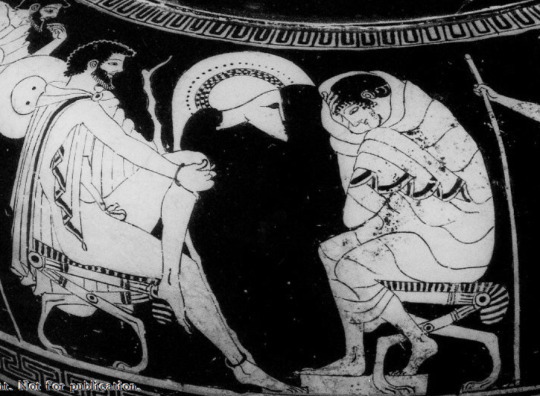
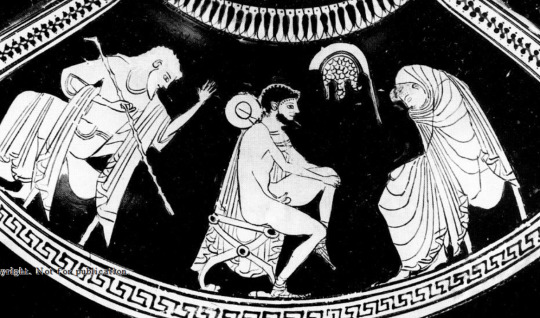


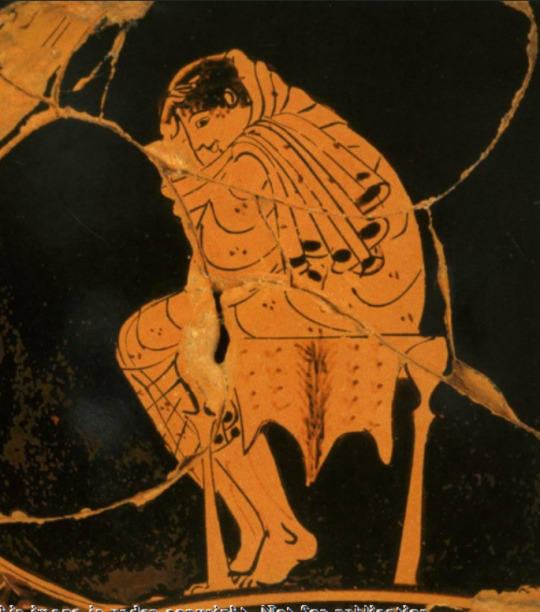
achilles looking all "make him stop make him stop make him stop"
6K notes
·
View notes
Note
The Hera throne story is one of my favorite myths due to how it emphasizes the complicated relationship between Hephaestus and his mother, and gives resolution to Hera and Dionysus’ animosity. It always annoys me when I see it reduced to Hephaestus just being a jerk that did it to marry Aphrodite.
Me too. It just reduces the character drama potential.
#you have no idea how vindicated I feel rn with everyone agreeing with me lol#greek pantheon#ancient greek mythology#greek goddess#hera#greek mythology#hera goddess#hera deity#hera greek mythology#Hephaestus#hephaestus greek mythology#hephastios#hephaestus god#hephaistos#hephaestus x aphrodite#aphrodite x hephaestus#dionysus greek mythology#dionysus#dionysos#Aphrodite#aphrodite greek mythology#aphrodite goddess
9 notes
·
View notes
Note
Zeus: Whoever can free my wife can marry A-
Athena: *About to make the coup against look like it was as simple as a sheep wandering off.*
Zeus: Aphrodite! Aphrodite! I was totally going to say Aphrodite!
LMAOOOO
#I love when ppl combine myths like this#I also like to think Ares was already on his way before Zeus said anything#bc his mom was chained up of course he would#then when he came back and found out Zeus made Aphrodite a prize he was like 😐#greek mythology#ancient greek mythology#greek pantheon#greek goddess#hera#hera goddess#hera deity#hera greek mythology#zeus#zeus greek mythology#zeus deity#Athena#athena greek mythology#athena goddess of wisdom#athena goddess#athena deity#hephaestus greek mythology#hephaestus god#hephaestus#Aphrodite#aphrodite greek mythology#aphrodite goddess
13 notes
·
View notes
Note
People will be like ‘Hephaestus took Aphrodite 😣 he’s so horrible 😣 it’s his fault 😣😣😣’ when Athena’s near forced marriage and near rape by him is ignored. Like seriously if you really want to create sympathy for Aphrodite you have that why choose the one option that’s just ableist???
Exactly! Like sometimes I think I defend my faves too much and that I’m not critical enough but then I open tumblr lol.
Honestly I don’t care for the version that Zeus made the other gods compete in Aphrodite’s hand in marriage in order to free Hera. I think it’s more interesting for the gods to want to free Hera off their own accord, especially with Ares and Dionysus. Plus it refocuses on the actual drama potential between Hephaestus and Hera if Aphrodite was never involved.
Basically:
Hephaestus chaining Hera bc of her abuse >>> Hephaestus chaining Hera to win Aphrodite
#greek mythology#ancient greek mythology#greek pantheon#greek goddess#hera#hera goddess#hera deity#hera greek mythology#athena greek mythology#athena goddess of wisdom#athena goddess#athena#athena deity#hephaestus greek mythology#hephastios#hephaestus god#hephaestus#hephaestus x aphrodite#aphrodite x hephaestus#hephaistos#Hera children
7 notes
·
View notes
Note
what do you about Cyrene https://www.theoi.com/Heroine/Kyrene.html
She’s cool.
1 note
·
View note
Text
Y’all can be sympathetic to Aphrodite while not making up some (low key ableist) bs about Hephaestus, it’s insanely easy actually.
#like I defend Hera all the time but even I’ll admit she was wrong for how she treated Hephaestus#greek mythology#ancient greek mythology#greek pantheon#greek goddess#Aphrodite#hephaestus#hephaestus greek mythology#hephaestus god#hephaestus x aphrodite#hephaistos#aphrodite x hephaestus#aphrodite greek mythology#aphrodite goddess
18 notes
·
View notes
Note
There's this crack ship that i found out exist and that is demeter x loki from norse mythology, and the reason for that it's because they were both raped by a horse as horses.
Well… that’s definitely a crack ship.
#greek mythology#ancient greek mythology#greek pantheon#norse mythology#Loki#Demeter#demeter greek mythology#demeter goddess
4 notes
·
View notes